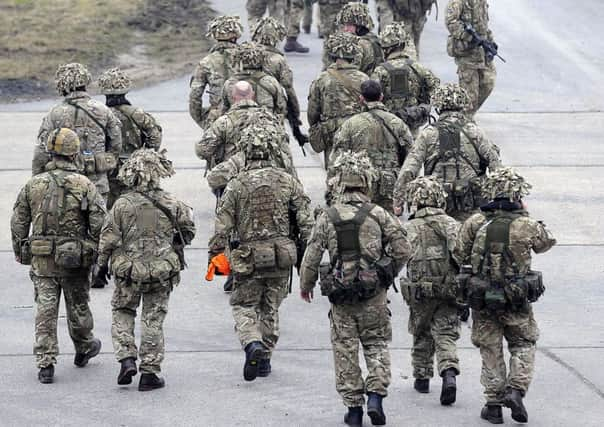Soldiers posted to Scotland set for rebate on higher income tax


Top brass are understood to be examining a scheme to make up any shortfall amid concerns the new Scottish tax regime could result in Scottish postings being seen as unattractive.
The impact of the Finance Secretary’s proposal to increase taxes for those earning more than £33,000 on the 14,000 servicemen and women based in Scotland is being discussed by defence officials.
Advertisement
Hide AdAdvertisement
Hide AdUnder Mr Mackay’s plans to put a penny on income tax on salaries over £24,000 and cut a penny in the new starter band of between £11,851 and £13,850, a staff sergeant on £37,697 would pay an extra £117 a year in Scotland.
An army major on £50,417 would pay an extra £660 while a lieutenant colonel on £70,760 would pay £863 extra. A full colonel on £85,726 would have to pay an extra £1,013.
Last night the MOD said it was monitoring the effect of the Scottish rates of income tax. But The Scotsman understands officials are actively exploring the possibility of providing compensation to make up the shortfall and ensure a level playing field across the UK for servicemen and women.
Service personnel stationed in Scotland will have to pay the Scottish rate of income tax if a base in the military estate is their “main” or only “place of residence”. Similarly, if they live in Scotland outside of the military estate they will be forced to pay Scottish rates of income tax.
Andrew Bowie. Scottish Conservative MP for West Aberdeenshire and Kincardine, said: “It’s becoming increasingly clear that the SNP has charged ahead with their Nat tax without thinking through the consequences.
“The fact that armed personnel are facing a ‘Scottish surcharge’ simply for living north of the Border will strike most Scots as deeply unfair. There is no good reason why anyone should be forced to pay more in income tax than people elsewhere in the UK.
“It shouldn’t be up to the MoD to have to compensate those being forced to pay more. The SNP need to think again.”
Mr Mackay earlier this month announced his proposal to increase the number of income tax bands in Scotland from three to five.
Advertisement
Hide AdAdvertisement
Hide AdThe old basic rate band of £11,850 to £44,290 will be split into three with the creation of the starter band plus a intermediate band between £24,000 and £44,273.
The Finance Secretary argued cutting the rate from 20 per cent to 19 per cent in the starter band would mean the majority of Scottish taxpayers would be paying less income tax than their counterparts in the UK.
For example, a private soldier earning £18,488 would receive an annual tax cut of £20 while a lance corporal on £25,524 would have a cut of £5.
Mr Mackay’s critics, however, pointed out the cut only amounts to a maximum of £20 per year. They also said his plans to increase the rate paid in the intermediate band from 20 per cent to 21 per cent, plus plans to increase the higher rate by a penny to 41 per cent, will hit middle earners. Mr Mackay resisted calls to impose a hefty tax hike on the top earners taking home more than £150,000 per year. He limited the increase to 46 per cent despite calls to lift the top rate from 45 per cent to 50 per cent,
There are 147,370, regular armed forces personal of whom 9,330 (6.3 per cent) are deployed overseas. It has been estimated that 900 of those serving abroad are defined as Scottish for taxpaying services. A MoD spokesperson said: “The MoD continues to monitor the impact of Scottish income tax on the workforce and provide further information as decisions are taken and announced by the Scottish Government.”
A Scottish Government spokesman said: “The new starter rate we are proposing, combined with an increase in the personal allowance, will result in 70 per cent of all income taxpayers paying less tax than they do this year for a given wage and 55 per cent of Scottish income taxpayers will pay less tax than people earning the same amount and living in the rest of the UK in 2018/19.
“We are fully committed to supporting the armed forces community. Service provision varies in different parts of the UK and Scotland continues to be an attractive place to live, work and do business.”